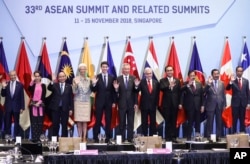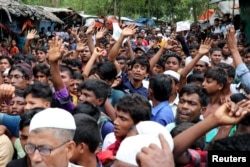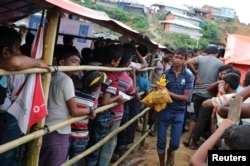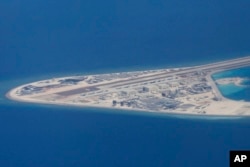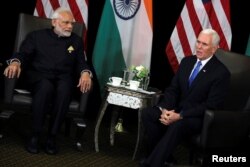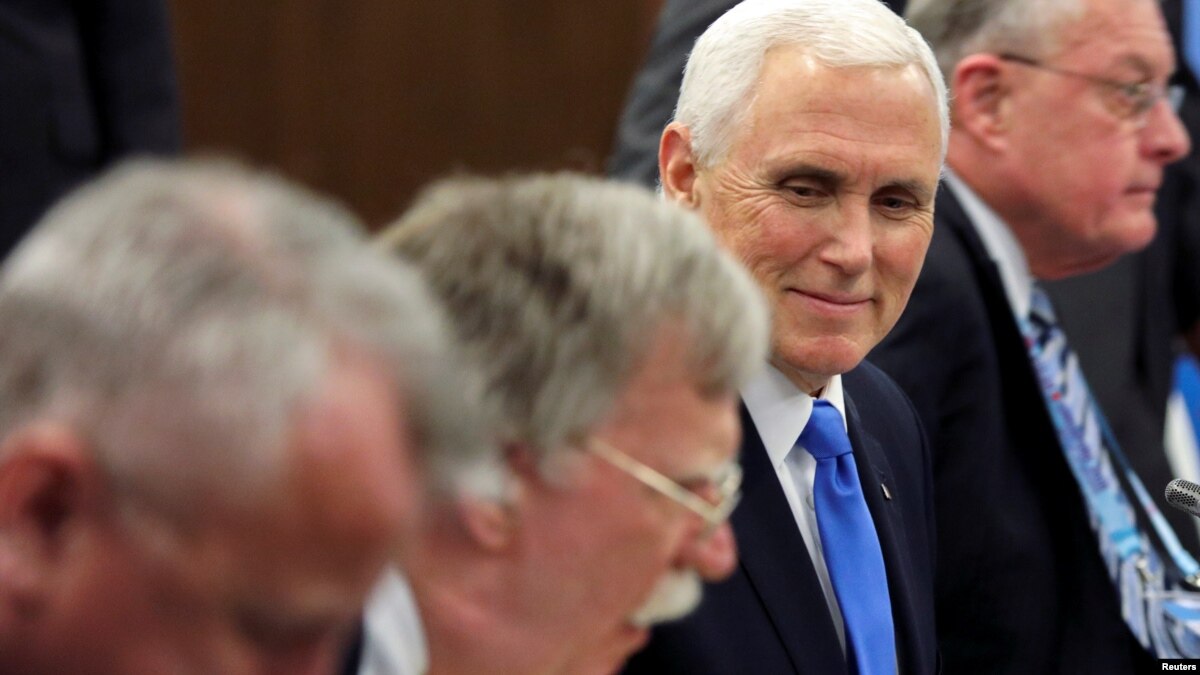
[ad_1]
While leaders from 10 Southeast Asian countries largely discussed trade in Singapore Wednesday, participating U.S. Vice President Mike Pence focused on keeping Asian seas open internationally despite Chinese expansion. He also sought help in checking North Korean nuclear ambitions and pressed Myanmar on its treatment of Rohingya refugees.
At an annual summit for the Association of Southeast Asian Nations (ASEAN), heads of state talked business throughout the day with one another as well as with officials from larger countries, including India, Russia and China.
But Pence steered most of his talks Wednesday toward geopolitics.
Rohingya issue
In a meeting with Myanmar leader Aung San Suu Kyi Wednesday, Pence asked for a report on any progress in pursuing military forces who might have persecuted the stateless, Muslim Rohingya population — a source of conflict since the 1970s.
Washington “desires a prosperous, peaceful successful civil society in Burma with a free and independent press,” Pence said, using the country’s former name.
“This is a tragedy that has touched the hearts of millions of Americans,” he said. “The violence and persecution by military and vigilantes that resulted in driving 700,000 Rohingya to Bangladesh is without excuse.”
More than 730,000 Rohingya have fled into Bangladesh since August last year from what UN investigators say is genocide. Myanmar has consistently denied the charge and says the campaign was a legitimate response to what it called terrorist attacks.
“I’m anxious to hear about the progress that you’re making holding those accountable, who are responsible for the violence that displaced so many hundreds, created such suffering, including the loss of life.”
Pence said the United States was “encouraged by some signs that some families will begin to find their way home and the vice president made it clear that that must take place in a manner that’s transparent and safe and voluntary,” a U.S. official told reporters after the meeting.
The Myanmar leader lowered her voice and told Pence “you should exchange views and then to understand each other better.”
“We are in a better position to explain to you what is happening and how we see things panning out,” she said.
South China Sea
Earlier Wednesday, he told Indian Prime Minister Narendra Modi that recent Asian naval exercises were “evidence of our commitment to ensuring free and open access to the seas all across this region.” Both India and the United States have tried to keep China in check as it militarizes islets in a disputed sea to its south.
On Tuesday, Chinese Premier Li Keqiang called on ASEAN to work together with China in that waterway, the South China Sea. Four ASEAN nations — Brunei, Malaysia, the Philippines and Vietnam — contest Chinese maritime claims.
ASEAN has pushed China for two decades to sign a code of conduct that would help prevent mishaps on the sea. The two parties restarted talks on the code last year but they’re expected to sit it out in 2018 over concerns about sovereignty issues and dispute resolution methods.
“It depends on China,” said Termsak Chalermpalanupap, a fellow with the ISEAS Yusof Ishak Institute in Singapore. “Actually ASEAN says it can be done within one month, since we already have a single draft for the negotiation. We just fill in some details and that’s it.”
North Korea
Also in his meeting with Modi, the U.S. vice president urged more help on relations with North Korea. The U.S. government regards North Korea as a hermit state with missiles and nuclear weapons capable of striking Western-allied neighbors.
“We are grateful to India’s strong support of our pressure campaign,” Pence said. “But we look forward to finding even more ways we can work together, even as the president [Donald Trump] moves toward another summit with Chairman Kim in the hope that we can finally bring a lasting peace to the Korean Peninsula.”
But Washington and Pyongyang are preparing for a second Kim-Trump summit even amid reports that North Korea may have stockpiled 60 nuclear weapons.
Pence was scheduled later Wednesday to meet Indonesian President Joko Widodo and attend a dinner hosted by the Singapore prime minister.
ASEAN trade
Pence said little about trade Wednesday, although he did tell Vietnamese Prime Minister Nguyen Xuan Phuc that he envisioned a “more fair and reciprocal trade arrangement going forward.”
ASEAN, which was formed five decades ago, derives its power largely by leveraging a combined market of more than 600 million people to sign trade pacts abroad. Southeast Asian countries export low-value factory goods, migrant labor and natural resources to much of the world.
While the regional leaders are discussing trade deals in Singapore, the summit through Thursday will probably only produce a joint statement rather than substantive deals, said Oh Ei Sun, international studies instructor at Singapore Nanyang University.
“The ASEAN summit, from what I observe, is basically more opportunities for the leaders to meet other leaders bilaterally rather than coming up with something concrete multilaterally,” he said.
Patsy Widakuswara contributed to this report.
